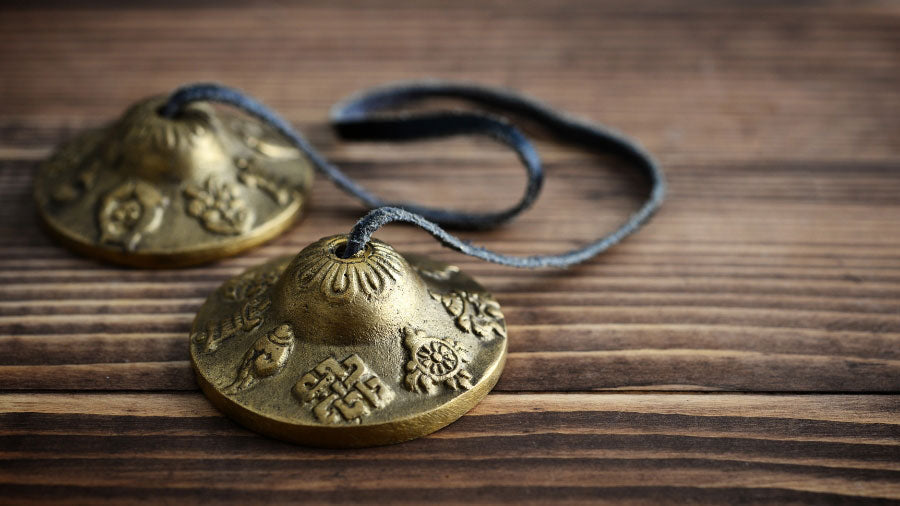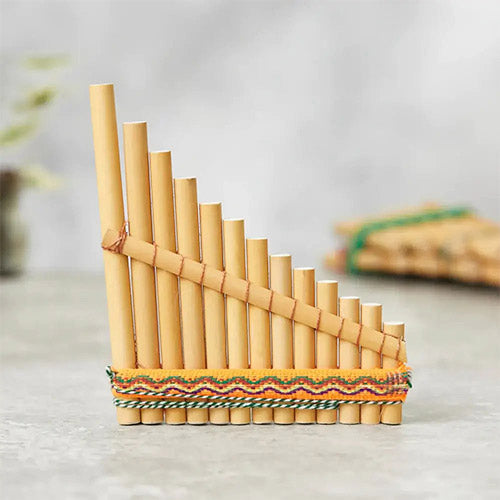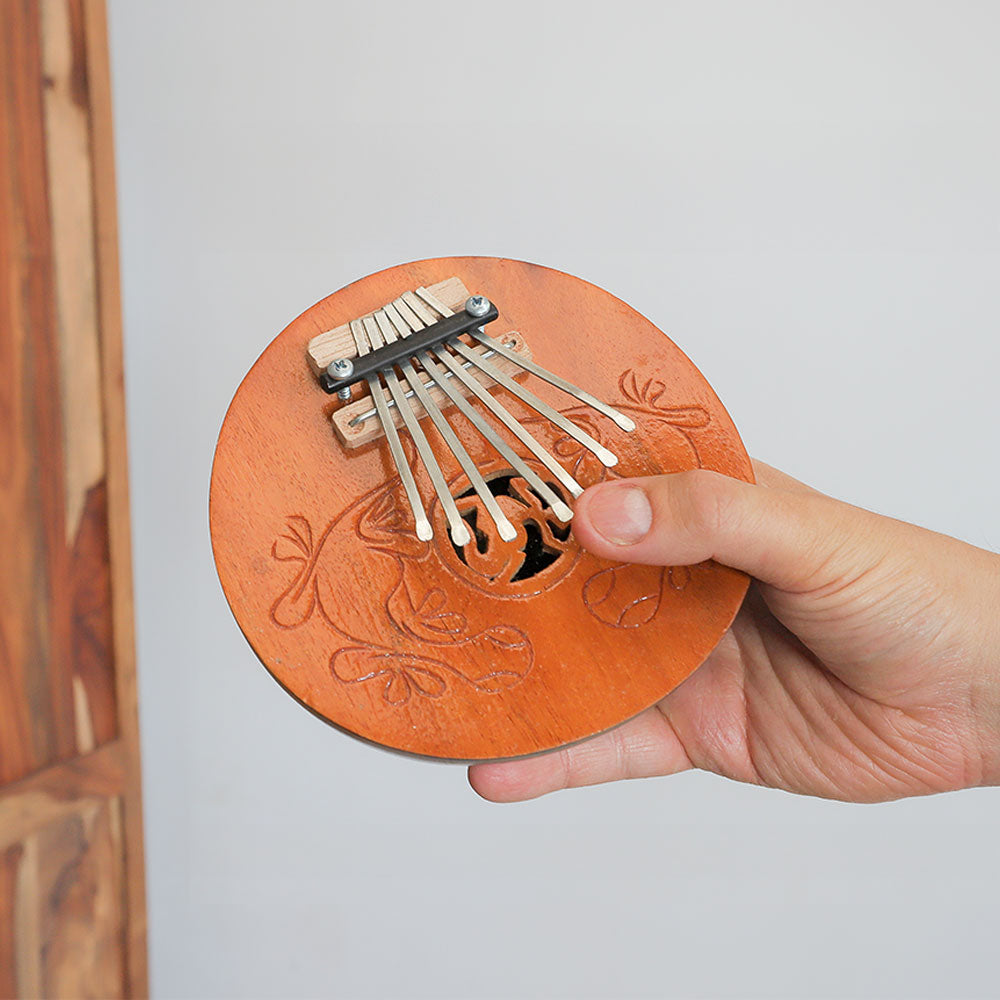Tingsha are small, cymbal-like percussion instruments traditionally used in Tibetan Buddhist practices. Consisting of two metal discs connected by a leather strap or chain, they produce a clear, high-pitched ringing sound when struck together. Tingsha are commonly used by monks, meditators, sound healers, and yoga practitioners to mark the beginning or end of a session, clear energy, or aid in mindfulness and concentration. While they originate from Tibet, their use has spread globally, especially in spiritual, wellness, and sound therapy circles, with strong popularity in Nepal, India, and Western countries focused on holistic practices.
History of Tingsha
The history of Tingsha dates back hundreds of years and is rooted in Tibetan Buddhist rituals, where they were originally used during prayer ceremonies, offerings, and purification rites. While no single inventor is known, Tingsha are believed to have been developed by Tibetan artisans and monks, likely between the 16th and 18th centuries, during the flourishing of Tibetan monastic culture. They were traditionally handcrafted from a special bronze alloy and finely tuned for spiritual purposes. With time, their role expanded beyond religious ceremonies into modern spiritual and meditative practices worldwide.
Types of Tingsha
Tingsha come in various types, primarily differentiated by size, sound tuning, and decorative details. Some are tuned to a specific pitch or frequency (such as 528 Hz or other solfeggio tones) for sound healing, while others are untuned and produce a more organic, varied tone. Common varieties include plain Tingsha used in monasteries, engraved ones with Buddhist symbols like the Eight Auspicious Signs or dragons, and therapeutic Tingsha tuned for vibrational healing. They typically range from 2 to 3 inches in diameter and are valued for their long sustain, pure tone, and spiritual resonance.
Tibetan Tingsha Bells

★★★★★ - “Wonderful items and service. Couldn't rate highly enough”. - Verified Buyer
Tibetan Tingsha Bells are traditional paired cymbals used in Tibetan Buddhist rituals, meditation, and sound therapy. Handcrafted in Nepal and made from sustainable metal and leather, these bells are known for their thick structure and clear, high-pitched tone that lingers in the air—helping deepen focus and spiritual awareness. Often crafted from bronze alloys that produce rich harmonic overtones, each pair is unique in color, size, and design. These fair trade, eco-friendly instruments are both functional and symbolic, perfect for prayer, mindfulness, or sound baths.
Purchase the Tibetan Tingsha Bells Here.
Colourful Tingsha

Colourful Tingsha are traditional Tibetan prayer bells designed for meditation, mindfulness, and sound healing. With vibrant painted finishes and intricate symbolic etchings, these circular cymbals emit a clear, soothing chime that fosters calm, inner peace, and spiritual focus. Crafted from durable metal alloy and sold as a pair, they are ideal for yoga, self-reflection, or simply enhancing a tranquil space. Whether displayed or hung, each piece reflects traditional Tibetan spirituality while offering both beauty and function.
Purchase the Colourful Tingsha Here.
Large Om Mani Tingsha

The Large Om Mani Tingsha from Nepal is a handcrafted set of prayer cymbals engraved with the sacred Om Mani Padme Hum mantra, symbolizing compassion, wisdom, and enlightenment. Measuring 72mm in diameter and made from high-quality metal alloy, they produce a clear, resonant tone ideal for meditation, sound healing, and spiritual rituals. With spiritual etchings and a traditional Nepalese design, they serve as both a meaningful practice tool and a striking decorative piece that invites calm and focus into any space.
Purchase the Large Om Mani Tingsha Here.
Tips for Choosing the Right Tingsha
When choosing the right Tingsha, consider factors like size, material quality, sound clarity, and engraving details. Larger Tingshas tend to have deeper, more resonant tones, while smaller ones produce higher-pitched chimes. Always listen to the sound before purchasing if possible, as tones can vary even among similarly sized pairs. Handcrafted Tingshas from Nepal or Tibet, especially those made from traditional bronze alloys, often offer richer overtones and spiritual significance. Tingshas are suitable for meditation practitioners, yoga instructors, sound therapists, or anyone seeking a calming auditory tool for mindfulness or spiritual rituals.
The Pros and Cons of Buying a Second-Hand Tingsha
Buying a second-hand Tingsha can be a cost-effective way to access quality craftsmanship, especially if it’s an antique made from traditional materials with historical significance. However, downsides include potential wear, cracks, or imbalanced tones due to damage or age. New Tingshas, particularly handmade ones, ensure better condition and reliable sound, with many also supporting fair trade practices. Handmade pieces offer unique variations and deeper spiritual resonance. If you value consistent sound and ethical sourcing, new handmade Tingshas may be best. But if you're a collector or enjoy items with history, a carefully chosen second-hand set could be a meaningful choice.
Unique Tingsha Accessories
Tingsha accessories can enhance both their protection and use. Consider a padded storage pouch or a fabric-lined box to prevent scratches and preserve tuning when not in use. For display, stands or wall hooks can highlight their spiritual beauty. A soft dry cloth is essential for regular cleaning to maintain the metal’s sheen. Some practitioners also pair Tingshas with other instruments like singing bowls for layered soundscapes during therapy sessions. Incense holders or altar cloths may also complement their ritual use.
Tingsha in Popular Music
Tingsha bells are most often used in spiritual, ambient, and meditative music genres, particularly within sound healing, mindfulness, and yoga settings. Their clear, high-pitched chimes add texture and focus in sound baths or as cues in guided meditations. While not widely featured in mainstream music, artists like Deva Premal and other world music or new-age musicians incorporate Tingshas into recordings for their calming and sacred tones. They're also occasionally sampled in cinematic scores or atmospheric soundtracks to evoke a sense of tranquility or spiritual depth.







